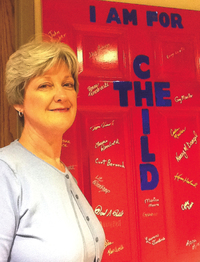Court decisions often affect children and parents for a lifetime, so volunteers who help legal officials obtain an unbiased review of a family’s situation are invaluable.
That’s what prompted development of Court-Appointed Special Advocates (CASA) more than 35 years ago.
Yankton’s Southeast CASA Program Director, Sherri Rodgers-Conti says volunteers can expect a “meaty” experience.
“Before we accept volunteers, we complete a thorough background check,” Rodgers-Conti says. “Every case involves a lot of responsibility on the volunteer’s part. Cases can be short or sometimes go on for quite some time.
What causes volunteers to become involved is the opportunity to make a real difference in a child’s life.”
CASA originated in 1977 in Seattle, WA, when a judge there believed he needed more information about a family abuse and neglect situation before he could make a fair decision about where the children should be placed.
Because he couldn’t afford to hire additional court employees, he organized a program for volunteers to receive training in how to complete child advocacy work. His effort was so successful that court jurisdictions across the U.S. used the model to establish their own CASA programs. More than 1,000 CASA programs and 700,000 CASA volunteers are now available in U.S. communities.
“Even with this many programs and volunteers, more than 65 percent of American children in need of a CASA volunteer don’t have access to one,” Rodgers-Conti says. “Yankton’s CASA program opened in October 2011.
Since the Court began appointing CASA volunteers to cases in April 2012, we have provided advocacy services for 25 children, resulting in 100 percent of Yankton County’s children-in-need having a CASA volunteer. Our goal is to continue that service for every child in need in Yankton County and eventually include CASA services to qualifying children in Bon Homme, Clay, Union, Turner and Charles Mix counties.”
Children who qualify for CASA services are those who have been abused and/or neglected and placed in foster care. Training for advocates is provided through the local CASA office.
“Our biggest challenge is increasing awareness of the CASA program and sustaining our funding,” Rodgers-Conti says. “Local support is crucial to our ability to provide a highly-trained CASA volunteer for every child who needs one. We’re doing all we can to make sure everyone in the community and surrounding area understands the importance of making this service available to children who otherwise would have no voice in how their future is determined.”
The benefits of the CASA program don’t end with a judge’s decision about placement of a child. Children who grow up in safe, nurturing homes are more likely to have good school attendance, effective interpersonal skills, complete high school and become lifelong contributors to their community rather than adult recipients of social welfare programs.
“Most importantly, through the CASA program, a cycle of abuse and neglect is broken,” Rodgers-Conti says. “Supporting CASA takes many forms. In addition to becoming a trained CASA volunteer, volunteers can serve on the Southeast CASA Board of Directors, participate in a fundraising event committee or respond to local fundraisers.
Clubs and organizations might also implement an event on behalf of CASA, make a financial contribution and help us raise awareness of the program.”
Some CASA donors have honored someone with a financial donation. Others have designated CASA as the recipient of missionoriented donations to help at-risk youth.
“One work group gave their ‘Casual Friday’ donations for one month to Southeast CASA,” Rodgers-Conti says. “We want to begin reaching out to other communities in this part of South Dakota, but we have to establish a sustainable funding source before we can accomplish that.”
Rodgers-Conti notes that one of the main misperceptions about CASA is that the objective of volunteer advocates is to keep children from returning to their homes.
“CASA volunteers are unbiased as they work on their case,” she says. “They don’t work for or against parents in an abuse and neglect case. The volunteer works to find factual information the Court needs to make a child’s permanent placement determination.
Volunteers are reminded throughout their training that the truth of what’s best for the child will emerge as they work their case. They often don’t know what recommendation they’ll make to the court until late in the case. They just know that the information they provide helps the court reach that decision.”
Rodgers-Conti says her office consistently seeks opportunities to make presentations to the community about CASA and its benefits.
“It takes about $1,000 to provide a child with an advocate,” she says. “We want southeast South Dakota to be aware of the program’s benefits and of the critical need so they can make decisions about how to bring the service to their community.”
One of Yankton’s CASA volunteers, Pat Grant, experienced foster care as a child. Volunteering with CASA has special meaning for her.
“I feel very good about giving parents a chance to renew their lives and relationship with their children,” Grant says.
Rodgers-Conti, who serves as Southeast CASA office administrator, volunteer recruiter and case manager, has learned a great deal about the program since accepting the role of director.
“I had a good friend who was a CASA volunteer in another community,” she says. “I wasn’t aware of all the benefits the program provides for both families and communities. It’s very rewarding to be part of the good work volunteers are doing. I admire their dedication and commitment. They’re going to great lengths to help children in our community.”
More information about the program is available at www.southeastcasa.org.



